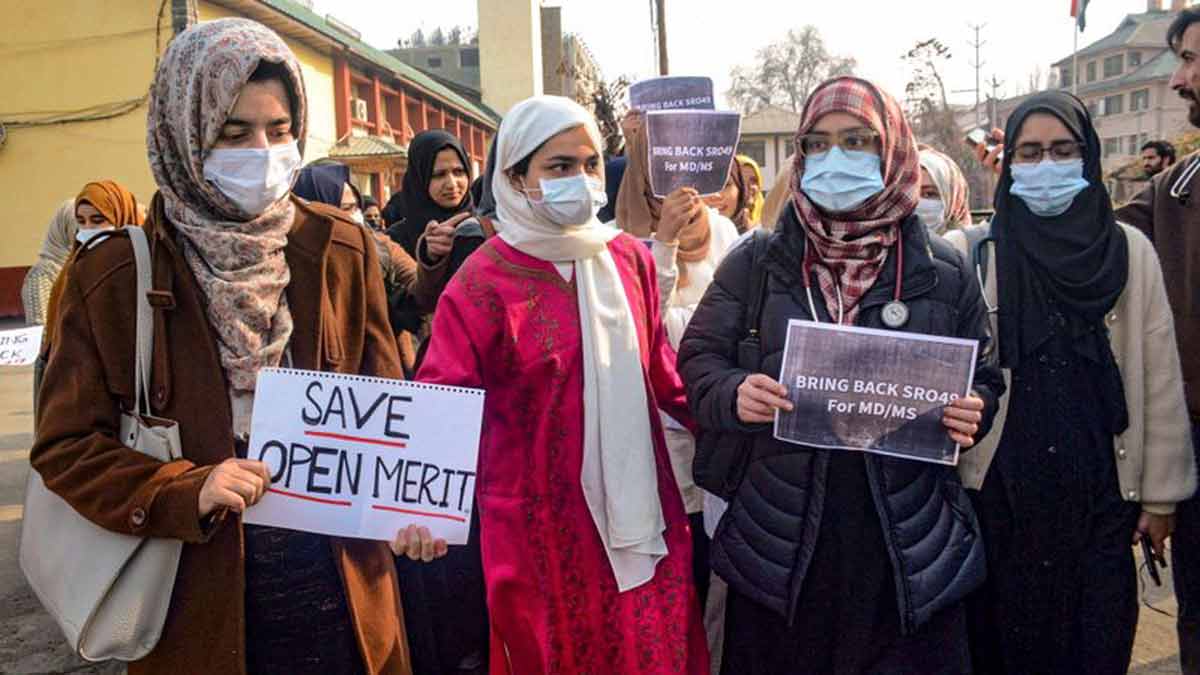Why Divisional Reservation is Essential for Kashmiri Students in Jobs and Admissions
By: Javid Amin | Srinagar | 30 June 2025
A Growing Crisis of Representation
In the heart of Jammu & Kashmir, a silent but severe crisis is unfolding. Kashmiri students—once fairly represented in academic admissions and government recruitment—are now seeing their dreams eroded by a reservation system that increasingly marginalizes their presence.
With excessive and poorly balanced quotas, lists after lists of job appointments and professional course admissions show a disturbing drop in Kashmiri representation. For instance, in a recently released list of 26 Junior Assistant posts, only five were from Kashmir. What was once considered an exception has now become a recurring pattern.
The Impact of Unequal Reservation: Numbers Don’t Lie
Let’s be clear—reservation policies are meant to uplift the marginalized, not marginalize the meritorious. While reservations for socially and economically disadvantaged groups are constitutionally protected, they must be balanced regionally—especially in a diverse and demographically unique Union Territory like Jammu & Kashmir.
Kashmir’s students are caught in a policy trap where:
-
A limited percentage of open merit seats remains after layered quotas.
-
Geographic and ethnic disparities are deepening due to lack of divisional safeguards.
-
Hardworking students are outcompeted, not on performance, but on place of origin.
This is not equity. This is silent exclusion.
Why Divisional-Based Reservation is the Need of the Hour
A divisional reservation policy, similar to models used in other Indian states with regional imbalances (like Telangana, Tamil Nadu, and Karnataka), is urgently needed in Jammu & Kashmir.
Here’s why:
-
Geographic Balance: J&K has distinct regions—Kashmir, Jammu, and Ladakh—each with unique challenges. Policies must reflect this diversity to ensure fair representation.
-
Prevent Regional Discrimination: Current data suggests that recruitment and admissions are systematically skewed against students from Kashmir. Divisional quotas can correct this imbalance.
-
Empowering Local Talent: Most Kashmiri students cannot afford to study or work far from home due to financial or social constraints. Equal opportunities in their own division can change lives.
-
Safeguarding Youth Aspirations: Divisional reservation can restore hope and fairness, giving students a reason to believe in the system again.
What Divisional Reservation Could Look Like
A well-designed divisional reservation policy might include:
-
Separate merit lists for Kashmir and Jammu divisions.
-
Fair allocation of reserved categories within each division.
-
Local preference policies for jobs and admissions, especially for rural or underrepresented districts.
-
Transparent audits and public disclosure of divisional representation in every recruitment list.
This approach wouldn’t eliminate reservation—it would make it just and regionally sensitive.
Voices from the Ground: What People Are Saying
The rising frustration among Kashmir’s youth is not just emotional—it’s rooted in facts. Social media, civil society discussions, and even political speeches are now echoing the same concern: “Where are our students in the lists?”
One parent from Anantnag said:
“My son topped his class. He cleared all phases of the exam, but the final list didn’t have a single Kashmiri. This is not merit. This is murder of merit.”
Students, too, are asking:
“If we can’t get jobs or college seats in our own land, where are we supposed to go?”
This Isn’t Just About Kashmir—It’s About Justice
This is not an anti-reservation argument. It is a pro-fairness appeal. Even in the Indian Constitution, Article 16(4) allows special provisions for certain classes “in the opinion of the State” to ensure equality of opportunity.
If reservation becomes a tool of exclusion, it violates the very spirit of equality it was meant to uphold.
What Needs to Happen Next
-
Comprehensive Review of the Current Reservation Policy
The government must conduct a transparent, region-wise audit of all recruitment and admission results from the past five years. -
Policy Redesign with Divisional Equity
Just like Ladakh introduced the toughest land and job laws in the country to protect locals, Kashmir too needs a tailored, division-conscious quota system. -
Legislative & Judicial Action
The matter needs to be brought before legislative and possibly judicial forums to ensure the protection of Kashmiri students’ rights under Article 14 (Right to Equality) and Article 16 (Equality of opportunity in matters of public employment). -
Unified Public Voice
Parents, educators, students, civil society, and political leaders must come together to demand corrective action.
Silence is No Longer an Option
To pretend this isn’t happening is to lie to a generation. To remain silent is to become complicit.
We must say what needs to be said:
The current reservation structure is failing Kashmiri students. Divisional reservation is the only fair way forward.
Bottom-Line: Fairness Over Favors
A divisional-based reservation is not about favoring one group over another. It’s about leveling the field in a land where inequality has crept in quietly, through the backdoor of blanket policies.
Let us not wait until another generation loses faith in merit. Let us speak, demand, and shape a future where every Kashmiri student gets a fair shot—not just a chance, but justice.




